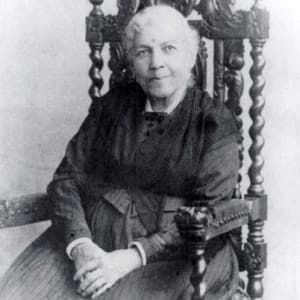
Bronson Alcott
Amos Bronson Alcott, teacher, mystic, writer and the father of Louisa May Alcott, became an itinerant teacher before settling in Boston to found his own school.
Synopsis
Born in 1799, Amos Bronson Alcott was self-educated with a voracious appetite for learning. After a 10-year stretch as an itinerant teacher, he founded Temple School in Boston, in 1834. He later became a major figure in the transcendentalist movement. He returned to education and was appointed superintendent of Concord Massachusetts Schools, where he perfected many of his progressive methods. Alcott's daughter Louisa May penned the famous novel Little Women. He lived out his remaining years in Concord, where he died at age 82, on March 4, 1888.
Early Life
Amos Bronson Alcott was a self-educated son of a farming family in old New England. Born in Connecticut on November 29, 1799, he had a curious mind and embraced learning all his life. He started out as a traveling salesman in the South, but soon discovered an early interest in teaching. Unsuccessful in seeking a permanent position in Virginia, he began a 10-year sojourn as an itinerant teacher throughout Connecticut, Pennsylvania, and Massachusetts.
Fledgling Educational Reformer
American education in the early 19th century was primarily focused on rote memory and ridged discipline. Influenced by educational reformers including Johann Heinrich Pestalozzi, Alcott believed in a more holistic approach where education stimulated the mind and awakened the soul. He engaged his students in Socratic dialogue to bring their ideas to the forefront. He treated children as adults, and would allow the class to address disciplinary problems as a group. Opposed to corporeal punishment of his students, Alcott would sometimes offer his own hand for a misbehaving child to strike, conveying that the child's misconduct was his failure as a teacher. Alcott believed this method instilled a sense of shame in the mind of the child.
Needless to say, Alcott’s teaching methods were considered controversial by some and ridiculous by others. As a result, he didn’t stay at one position for very long. He married Abigail May in 1830, but his sporadic teaching career didn’t provide enough income for his growing family. In 1834, Alcott established the first “progressive school” in America, Temple School in Boston. Under fire almost from the start, the school miraculously stayed open for six years. Its closing wasn’t due to its unorthodox methods, but because Alcott, an ardent abolitionist, had enrolled an African American girl in the predominantly white school.
The Transcendental Movement
In debt and jobless, Bronson Alcott and his family traveled to Concord, Massachusetts, where he befriended Ralph Waldo Emerson and Henry David Thoreau. Alcott’s daughters, Louisa May and Anna attended Thoreau’s Concord Academy. Alcott wrote for the Transcendental periodical The Dial and became a major figure in the emerging transcendental movement. His eclectic writings on life and religion were enlightening to some, while others found them unintelligible.
In 1843, hoping to put his transcendental principles into practice Bronson Alcott co-founded “Fruitlands,” a communal farm designed along the lines of Brook Farm. Alcott wanted to extend his ideas on vegetarianism and human rights well beyond the fabled utopian commune. In planting, Alcott and his followers cultivated “aspiring vegetables" that grew up toward the sky, rebuffing root vegetables that grew down in the soil toward hell. An ardent abolitionist, Alcott rejected slave-picked cotton cloth and leather because animals were killed for the material; instead, he designed clothing made from linen. After six months, the commune failed.
A Return to Education
In 1859, Alcott was appointed superintendent of Concord Public Schools. Delighted to have platform to once again practice his educational theories, he accepted the $100/year salary. He revamped the curriculum by introducing calisthenics, singing, and physiology with classes instructed using the Socratic method. He also established the first parent-teacher association. During his six years at the school, Alcott was able to advance and perfect many of his educational principles. His work inspired later educational reformers like John Dewey and many of Alcott’s practices are commonly implemented in schools today.
Later Years and Death
During the 1870s, Alcott’s ideas began to gain acceptance. He traveled around New England holding “conversations” and talking to many people about his ideas. He lectured in the Midwest, bringing a wider recognition to Emerson, Thoreau, and the entire transcendental movement. Though Alcott was working steadily with his speaking tours, his family continued to suffer from financial strife until the success of his daughter, Louisa May Alcott's novel Little Women, which gave the family the long awaited financial security it needed.
At age 80, Amos Bronson Alcott established the Concord School of Philosophy, believed to be the first adult education center in America. He serve as dean until suffering a paralyzing stroke in 1882. He died in Boston on March 4, 1888. Louisa May Alcott, who had been born on his birthday, died just two days later.




